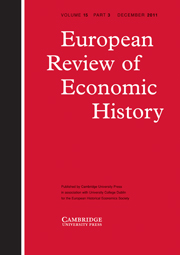Article contents
Did tariffs stifle Spanish agriculture before 1936?
Published online by Cambridge University Press: 07 September 2006
Abstract
This paper challenges the widely held view that tariff protection was the major factor in explaining the poor performance of Spanish agriculture in the half century prior to the 1936 Civil War. After examining the general level of tariffs, it is argued that these were not sufficient in themselves to explain either the poor diets or weak demand for manufactured goods. Secondly, farmers were slow to switch resources out of cereals, not so much because of the tariffs, but rather because of the limited export opportunities for alternative crops, especially olive oil and wine. Finally, the evidence suggests that those areas which saw a significant increase in the area of cereals were just as likely to see a decline in the agricultural population as those that did not, suggesting that the rural exodus was determined by factors other than the tariff.
Information
- Type
- Articles
- Information
- Copyright
- Cambridge University Press 1997
- 4
- Cited by

